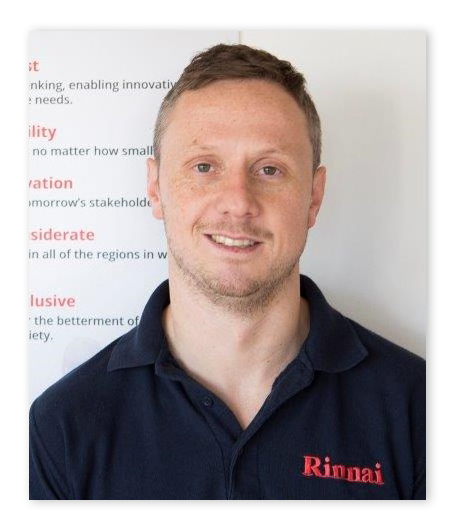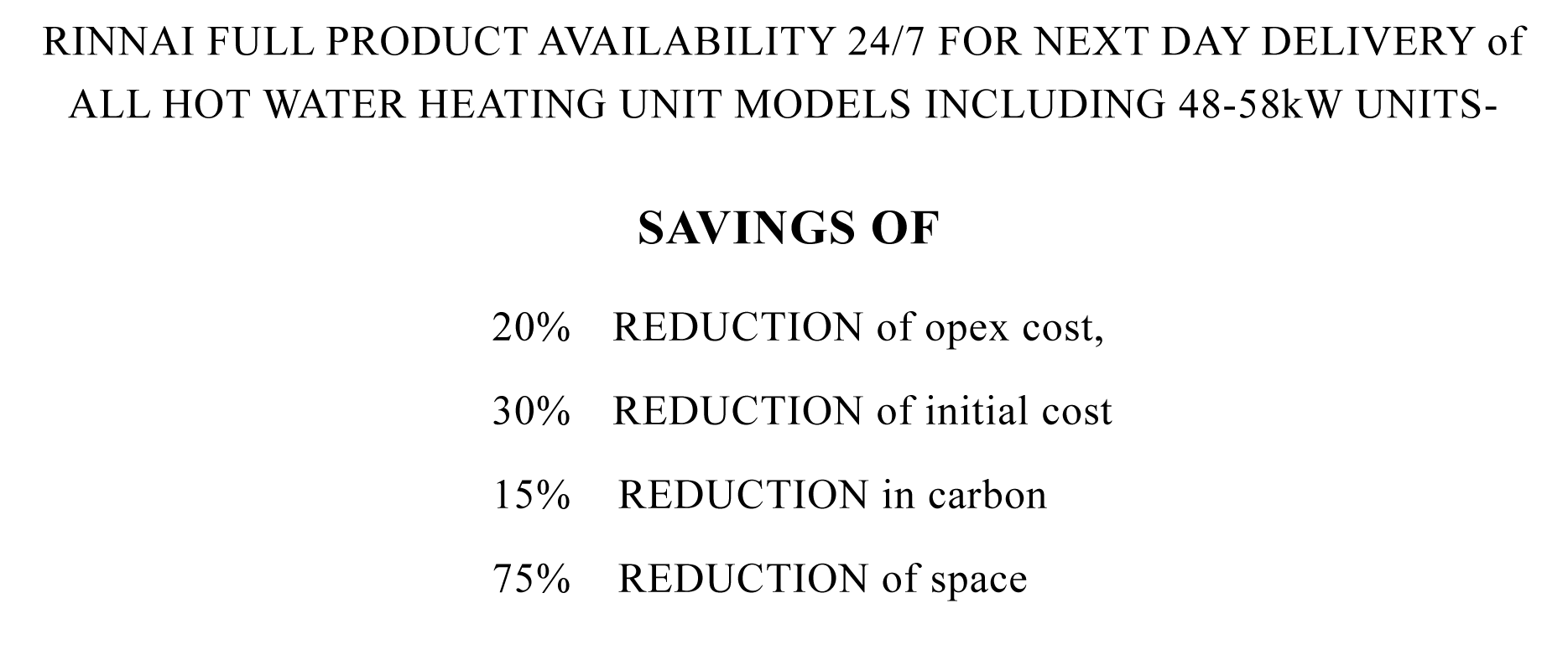Rinnai’s Chris Goggin examines the current UK heating and hot water markets with a detailed statistical analysis of each notable sector to reveal the preferred methods of supplying both residential and commercial properties with warmth and DHW. This review will also look at the impact of legislation upon customer options.
Technology used for heating and hot water options is both a major contributor and solution for lowering emissions. Gas boilers have long been identified as a cause of rising global temperatures but still the gas boiler maintains a central position in heating and hot water options due to customer convenience, cost, current infrastructure and regulations allowing for their permissibility for the mid to long term.
In time, if hydrogen gas mixes are made available, UK emissions emanating from natural gas-powered systems can also be reduced. However, despite a large increase in the portfolio of available appliances that deliver domiciles and commercial properties with heating and hot water, there is still widespread UK customer reluctance to purchase alternative forms of technology, such as solar, heat pumps and hybrid DHW systems. If gas boilers and water heaters are readily available and there are plentiful reasons as to why this is the case, ranging from a distress sales situation to a lack of trained installers through to cost and perceived practicalities.
This is problematic towards the aim of decarbonising 28 million dwellings and a further 2 million commercial premises in the UK. By 2028 the UK is determined or at least has the ambition to install 600,000 heat pumps nationwide. In 2024 the total number of heat pumps that had been installed in households across the UK stands at around 320,000. More than 65,000 have been installed from January 2024 to May 2025. UK heat pump installations throughout 2024 experienced a 40% increase – predominantly due to the government funding afforded to them.
Although, renewable energies and technologies are undoubtedly rising and have never been more attractive to UK customers, the problem is centred on more convenient, familiar and cost-effective energy – natural gas.
Gas boilers remain the dominant form of heating and hot water provision for domestic and commercial properties. Domestic gas boiler fittings are greater than heat pump connections by more than 15 to 1 in 2024. Despite national heat pump targets, only one in eight newly constructed homes were equipped with low carbon alternative technological options. Of the new build homes constructed in the UK throughout 2024 13% were finished with heat pumps as a primary source of heating and hot water. This is set to change with the Future homes standard and future building standard – however the replacement market remains a serious barrier for adoption.
A recent article published in the national UK media revealed that 1.5 million gas boilers were fitted across all sectors in the UK, most of which were replacements. Cost is an important factor once a UK household decides not to accept heat pumps over gas boilers. Costs relating to initial heat pump purchase for domestic properties range in between £5,000 and £18,000 whilst initial purchase costs of gas boilers start at £1,600 and can be up to as much as £6,000 – the figure skyrockets with commercial systems yet the sizeable cost difference between gas fired systems and heat pumps remains. High income households and successful commercial enterprises are more likely to view heat pumps as a viable purchase option.
Domestic and commercial Heat pump utilisation is vital towards UK national decarbonising efforts. If NetZero targets are to be met 450,000 households will have to make the switch to heat pumps every year by 2030. Heat pumps offer clean energy usage that alleviates the atmosphere from toxic pollutants in a way that gas boilers cannot albeit to be truly effective the UK government must continue the greening of the electricity grid.
Other alternative forms of clean energy that have become attractive to UK customers include solar. UK residential solar installations throughout February 2025 have contributed a large percentage of UK national solar capacity – 58MW and account for 73% of newly placed renewable schemes.
Statistics accumulated and released by the Microgeneration Certification Scheme (MCS) state that in between January 2024 and January 2025, 2000,010 home solar PV installations were implemented. 2024 saw 2.3GW of solar deployment across the UK, 20% of this is attributed to domestic rooftop solar panels with a further 20% deriving from commercial premises.
A rise in solar purchases can be explained by a drop in average cost to installation in UK household. January 2024 witnessed a domestic mean price of £9,238, whilst in December of the same year the average cost dropped to £7,561. The total average for the year rested at £ 8,198.
Policy is contributing towards the way in which homeowners and businesses select heating and hot water options. The UK alongside Ireland and Portugal were the only three European heat pump markets to expand last year, with sales in France and Germany being significantly reduced due to electrical costs, regulatory and political uncertainty as well as a lack of progress in new construction projects.
Heightened public awareness and acceptance of renewables due to policy amendments is also responsible for a huge increase in solar power distribution. Since 2010 there has been a 18,000% increase in total UK solar capacity. Solar options are popular amongst homeowners with an estimated 1.5 million UK domiciles owning solar panels.
Policy updates and NetZero aims continually produce better market conditions, refinement in technologies and increases in personnel capable of delivering decarbonising product installation. In 2024, 9,062 individuals successfully completed heat pumps training qualification courses, equating to a 15% increase from 2023.
Despite the dominance of gas boilers as heating and hot water provision for domestic and commercial properties alternative clean and renewable energy markets continue to grow and gain traction. Additional legislation like the Future Homes Standard 2025 and more stringent conditions towards EPCs (Energy Performance Certificates) will strengthen directives that enforce cleaner energy technologies upon households and commercial dwellings.
Future UK energies aim to be carbon neutral, all current renewable markets are in a healthy position and continue to expand with additional growth expected in the coming years. Work on encouraging lower income households also continues. It is estimated that only 19% of heat pumps are in the poorest third of areas whilst 45% are installed in the richest third of neighbourhoods. Initiatives like the Boiler Upgrade Scheme are assisting these ambitions.
Domestic and commercial properties are adapting the way in the which the UK seeks out and distributes cleaner energy, meaning that natural gas usage will be at some point be vastly reduced, then eliminated altogether.
CLICK HERE TO VISIT THE RINNAI WEBSITE
or HERE to EMAIL RINNAI
CLICK HERE For more information on the RINNAI product range








